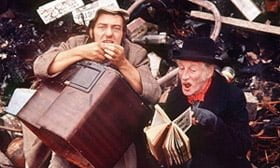Has someone been pinching your manhole covers? Has your auntie’s iron casket disappeared from her graveside? Has someone walked off with that Henry Moore piece from the garden?
Basically any piece of metal that’s not screwed down (and much of it that is) is being slurped up for the new Klondike – but this time it’s not gold fever but scrap metal madness.
The opening up of the giant Chinese, Russian and Indian markets has pushed scrap metal prices through the roof. Raw materials and new metal production cannot keep pace with the demand, so they are begging, borrowing and stealing anything that can be re-smelted to feed the ravenous beast. In the past two years scrap metal prices have increased by 95 per cent. Copper scrap has increased by 260 per cent. The current world price per tonne of scrap metal is £192 and, says the Times, and will be £250 by next year.
There are some advantages. In the past when I hired a skip for the annual spring clean, I would turn from good communist into Victor Meldrew. I’d put up watch towers and razor wire and keep a gimlet eye on the neighbours, riding shotgun to ensure the buggers didn’t put their crap in MY skip. Now the reverse is true. I got a skip the other week, filled it up – and when I came down in the morning, it was half empty! During the night, the scrap metal fairies had descended and run off with anything that so much as smelt of metal. Brilliant. I now have a bottomless skip that I fill to my heart’s content, even inviting the neighbours to join in the fun.
‘Combined and uneven development’…
It’s more of a headache for big business though. The modern day version of nicking lead off the church roof is reaching industrial proportions. British Telecomm complain they are losing £5 million a year as their lines are stripped for copper. It’s not just the thefts but the trail of damage the tea leaves (this means thieves, if you were nor born within the sound of Bow bells) leave behind – mobile phone companies say a typical theft of £100s worth of copper from one of their base stations leaves behind £50,000s worth of damage.
Britain’s footpads and ne’er-do-wells however are mere amateurs compared to what’s going on in Europe, where large tracts of heavy metal are vanishing. In Germany, railway chiefs in Weimar were left scratching their heads when three miles of railway line disappeared overnight. Czech police went tearing off to arrest known neo-Nazis when 320 bronze plaques were stolen from the Theresienstadt Holocaust
memorial – in the end a local scrap dealer turned out to be the culprit instead.
The market leaders however can be found in the Ukraine – a whole iron bridge disappeared from over the River Svalyavka, while a steam locomotive exhibit went walkies from a museum. They have big pockets in the Ukraine.
The deadliest hauls are coming from Iraq, as India’s metal smelters are discovering to their cost. The alloy found in armour plate on the many destroyed tanks that litter the country sells for a very high price. But in their rush to make a quick buck, the tank totters forget to take the live ammunition out. There have been several deadly incidents, such as the death of ten workers at the Bhushan Steel Company
in Ghaziabad near Delhi, when scrap metal imported from Iraq – which included live shells and rockets – was thrown into the smelter.
Most countries ban the import of scrap metal from war zones, but not India. The trade is worth $730 million every year. Government officials have blustered they will tighten up import regulations but, with those sorts of millions to be made, no one is holding their breath.
War zone scrap metal enters India through 32 ports. Only one of them has electronic screening equipment that can sniff out live ordnance. The Indian Customs service has told the BBC that the cost of installing such equipment to all ports would be ‘prohibitive’. Risking people’s lives is much cheaper.
So who is making all the money from this new boom? In the UK the current value of the scrap metal industry is a staggering £1.1 billion. Proof that where’s there’s muck there’s brass.
But it’s not the rag and bone men who are making their fortune. The real gangsters are moving in. The Times (7 April 2008) reports that "family owned firms across the country are being inundated with buy-out offers from ambitious rivals and private equity groups."
Of the top five scrap metal businesses in the UK, one is owned by the Australian multi-national Sims Metal Management while another is owned by, er, Barclays Private Equity. Yes, that’s right, the ‘Steptoe & Son’ branch of Barclays Bank. So if you bank with Barclays, the next time they send you a rude letter telling you that you have gone over your overdraft limit and demand the usual exorbitant penalty fee, don’t pay up. Instead, invite your local bank manager over for a rummage around your skip.






